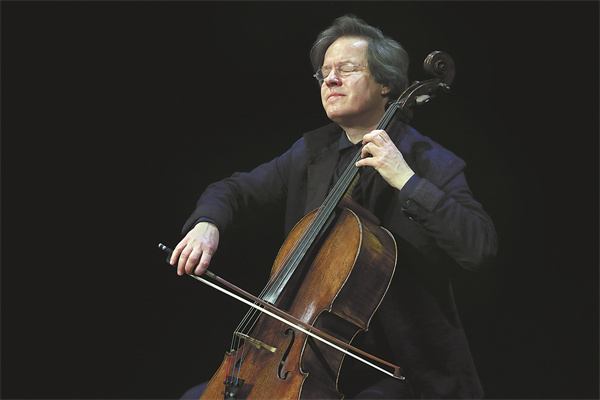

Cellist Jan Vogler gave his debut performance at the National Centre for the Performing Arts in Beijing on Sunday. He was excited to be one of the first international musicians to perform at the iconic venue since the country relaxed its pandemic-control measures.
"The pandemic forced us to be isolated. Before it, we really had a vivid cultural exchange. Now, we have to restart it. This concert is very special and a great way to resume exchanges again," said the renowned cellist a day before the recital.
Sitting in his dressing room at the NCPA, the cellist had a hectic agenda during his three-day visit to Beijing, including interviews, meeting with Lyu Jia — music director of the China NCPA Orchestra — and watching a performance by artists of a pingtan troupe from Suzhou that night at the venue. Pingtan is a genre of musical storytelling and ballad-singing in the Suzhou dialect. Though the old art form is foreign to him, the cellist was looking forward to the concert, which he described as a form of communication.
"We now realize how easily communication broke down during the pandemic, among families, friends and the whole of society. Now, we have a new chance to restart, so we should do something better. Is it only the music, or maybe something deeper and more from our heart?" the cellist says. "We hope that the audiences enjoy the concerts and go home feeling satisfied and joyful."
Alongside his career as a soloist, Vogler has been director of the Dresden Music Festival since October 2008, as well as artistic director of the Moritzburg Festival since 2001.
"We should never forget how wonderful it is to share music, theater and the exchange of ideas. There are lots of musicians from Europe coming to perform in China and we should encourage more Chinese musicians to perform in Europe," he says.
During his recital at the NCPA, which lasted for three hours, Vogler performed the six complete cello suites by Johann Sebastian Bach. Born into a musical family in Leipzig, Germany, Vogler made a recording of the six cello suites about 10 years ago. Bach moved to Leipzig in 1723 and he worked in the principal churches in the town. When he composed the six suites, the instrument was fairly new.
"I have listened to Bach's music since I was a child, on the radio, at concerts and when my father was teaching little kids. I first played the suites when I was 12 years old, and when I was much older, I dared to play all six suites and record them," recalls the cellist, adding that about 10 years ago, his father died, which inspired him to make the recording.
"I practiced very hard and I went to the studio to record one suite each day. It was like meditation, just me, my cello and Bach. After recording the suites, I felt better and lighter," he says.
Now, the cellist describes the six cello suites as "six houses where I can walk around freely".
"I know the 'houses' very well, and each time I walk around them, I discover something new, sometimes a new painting and sometimes a light from the window," he says.
The cellist has performed with internationally acclaimed orchestras such as the New York Philharmonic and the London Philharmonic Orchestra. Besides classical music recordings, he also worked with artists from different fields and explored the sounds of his instrument by exploring contemporary music styles. For example, his recording, Pop Songs, with the BBC Philharmonic, conducted by Omer Meir Wellber, was released in May 2022.
"My parents often held parties, at which musicians, actors, dancers and artists gathered. As a child, I couldn't imagine anyone's life without art. I was also inspired by those great artists to look forward," Vogler says.